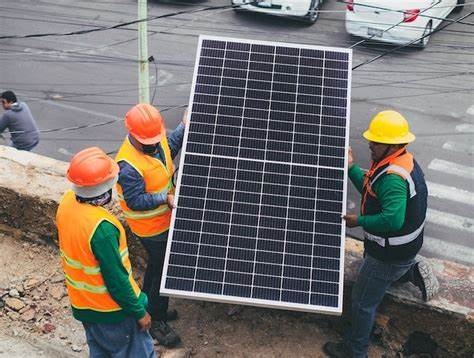- Resource Conservation: Solar panels contain valuable materials such as glass, aluminum, silicon, and other metals. By recycling these components, we can recover these valuable resources and reduce the need for new raw materials. This helps conserve natural resources and reduces the environmental impact of mining and processing raw materials.
- Waste Reduction: As the use of solar panels increases, the number of panels reaching the end of their operational life will also grow. Recycling helps prevent these panels from becoming electronic waste (e-waste) in landfills, where they can pose environmental risks due to the potential leaching of hazardous materials over time.
- Energy Savings: Recycling solar panels requires less energy than producing new ones from raw materials. The process of extracting, refining, and processing raw materials is energy-intensive. Recycling reduces the need for these energy-intensive steps, leading to lower carbon emissions and a smaller overall environmental footprint.
- Reducing Greenhouse Gas Emissions: Manufacturing solar panels, especially those made from silicon, generates greenhouse gas emissions. By recycling panels, we can offset some of these emissions by reusing existing materials instead of producing new ones.
- Promoting a Circular Economy: Recycling solar panels is a step toward establishing a circular economy, where products and materials are reused, repaired, or recycled at the end of their life cycle rather than being discarded. This approach reduces waste and encourages sustainable consumption patterns.
- Meeting Regulatory Requirements: In some regions, there are regulations in place that require the responsible disposal or recycling of electronic waste, including solar panels. Recycling helps individuals and companies comply with these regulations and avoid potential fines or legal consequences.
- Environmental Protection: Solar panels contain certain hazardous materials, such as lead and cadmium in the solar cells and circuitry. Proper recycling ensures that these hazardous substances are managed and disposed of in an environmentally responsible manner, preventing potential contamination of soil and water.
- Innovation and Research: The process of recycling solar panels drives research and innovation in sustainable technologies. Finding more efficient ways to recycle panels can lead to advancements in recycling methods and the development of new technologies to address electronic waste.
As solar energy adoption continues to grow, the need for recycling solutions will become more pressing. Developing efficient and cost-effective recycling methods is essential to minimize the environmental impact of the solar industry and ensure its long-term sustainability.


